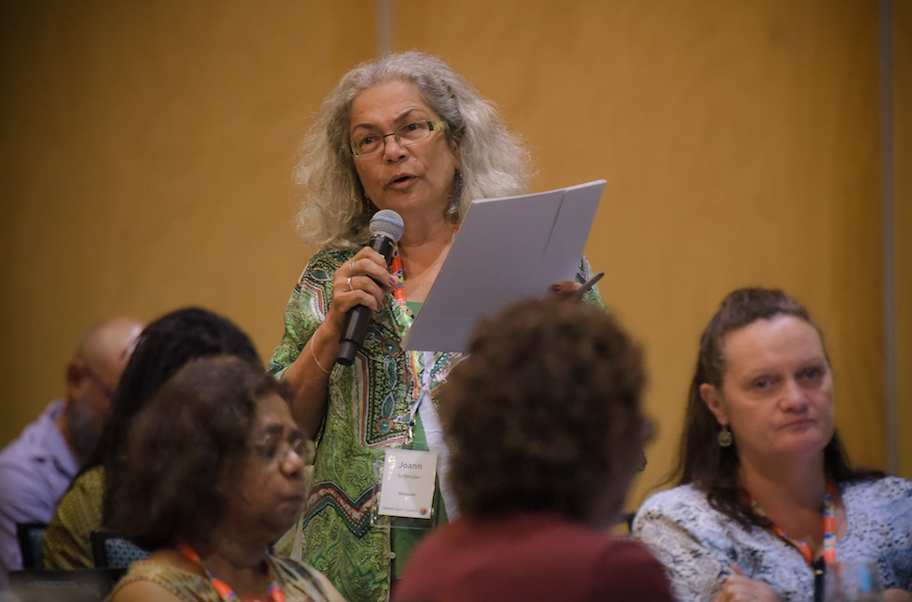Constitutional reform cannot occur without a proper reckoning of the past treatment of Aboriginal and Torres Strait Islander peoples and First Nations people must be given a greater role in determining their own future, according to Delegates who took part in the Regional Dialogue in Cairns this weekend.
On 24-26 March 2017, a meeting was held on Rainforest Aboriginal peoples’ Country in Cairns, bringing together representatives from the Cape, Gulf, the West, through to the Tropic of Capricorn to discuss possible constitutional reform.
The Dialogue was unique in that it covered a geographical region that involves the greatest number of Registered Native Title Body Corporates and Prescribed Body Corporates in Australia, resulting in the greatest number of ILUAs (quasi local “treaties”) and therefore the highest potential number of future treaty agreements.
This region has the highest concentration of combined Aboriginal and Torres Strait Islander population across the myriad remote, rural and urban settings, and notably comprises more than a third of the footprint of Northern Australia.

This was the eighth in a series of 12 First Nations Regional Dialogues being held around the country.
“Delegates at each of the Dialogues we have held to date, have travelled far and wide to attend and this has allowed us to hear the views of many in the community. We thank everyone who took part in the Cairns Dialogue,” Referendum Council Co-Chair, Pat Anderson said.
During the meeting, delegates reflected on their own histories and the racism and abuse they and their ancestors have experienced. This included periods of compulsory racial segregation during the protection era that involved forced labour, harsh physical treatment and abuse, and separation of family members. Delegates felt this history needs to be acknowledged for constitutional reform to progress successfully. One way of achieving this is through a Truth Commission; a reform idea that all Dialogues have raised.
First Nations peoples at the Dialogue discussed the need for their traditional customs and laws, as well as their connection to country and the spirit of their land to be recognised through substantive legal rights.
There was strong support for constitutional reform that delivers self-determination for future generations.
A voice to Parliament was seen as a priority and there was support for it to be constitutionally protected. The voice to Parliament could help First Nations people pursue economic empowerment that benefits communities.
“First Nations peoples are telling us they want to make sure laws and funding are effective so their children are safe, can get a good education, have a roof over their head, access health care, and continue to be connected to their culture,” Ms Anderson said.
“There is a view that programs and policies have not always achieved this because Aboriginal and Torres Strait Islander peoples haven’t been asked what is needed or been involved in delivery of services.”
Aboriginal and Torres Strait Islander peoples are the First Peoples of Australia, but they make up less than three per cent of the population. This means it can be difficult for them to be properly represented in government and influence laws that are made about them.
The Constitution could be amended by establishing an Indigenous body—as many other countries have—to advise Parliament on laws and policies with respect to Indigenous affairs. Such an amendment could ensure the views of First Nations peoples are heard by lawmakers.
Delegates at the Cairns Dialogue emphasised that the voice to Parliament needs to be elected by communities and have grassroots peoples at the top.
Strong support was also expressed for treaty.
Like Melbourne and other Dialogues, a minimalist form of constitutional recognition that only involves deletion of Section 25, removal of the word “race” or insertion of a new head of power like section 51A recommended by the Expert Panel [but without the fourth recital], and a statement of recognition, would be rejected as not substantive enough and merely re-running the 1967 Referendum.
The First Nations Regional Dialogue in Cairns is one of a series of 12 being held around Australia. The Dialogues culminate in a National Convention in Uluru in May.
In addition to the Dialogues, the Referendum Council is holding a nationwide consultation on constitutional reform and is seeking views from all Australians.
To get the full picture and join the conversation visit www.referendumcouncil.org.au. The consultation closes in early May 2017.
Following the consultation, the Council will report to the Government and the Opposition on the public’s preferences regarding constitutional reform.